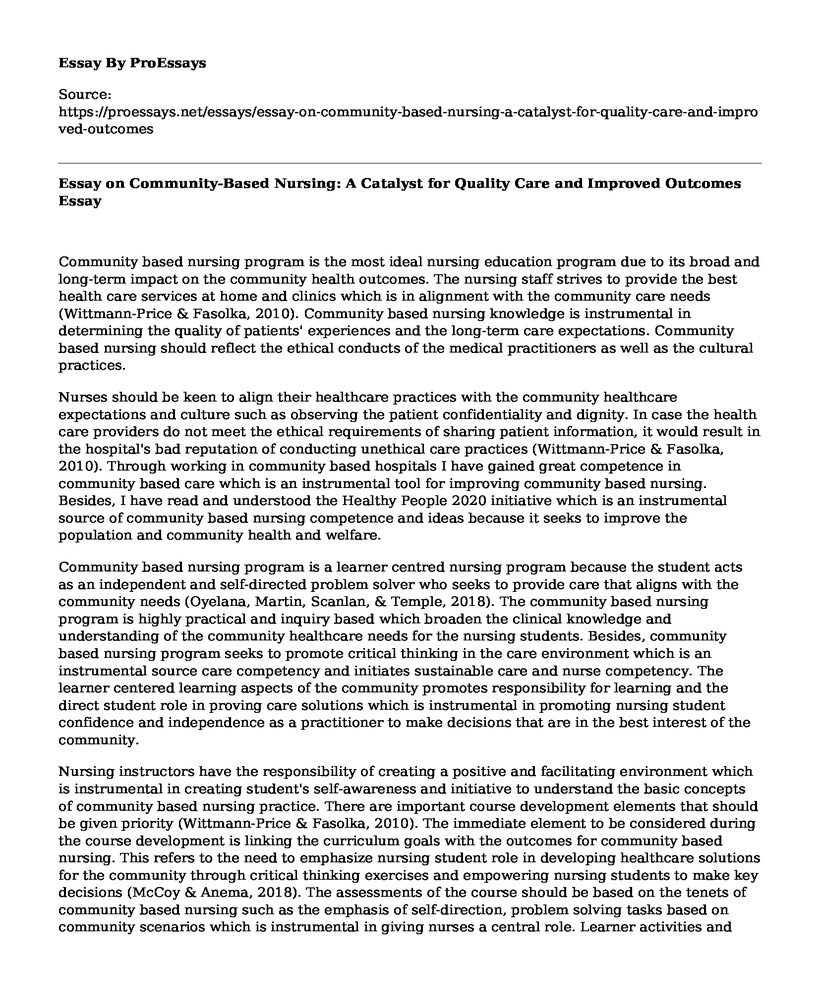Community based nursing program is the most ideal nursing education program due to its broad and long-term impact on the community health outcomes. The nursing staff strives to provide the best health care services at home and clinics which is in alignment with the community care needs (Wittmann-Price & Fasolka, 2010). Community based nursing knowledge is instrumental in determining the quality of patients' experiences and the long-term care expectations. Community based nursing should reflect the ethical conducts of the medical practitioners as well as the cultural practices.
Nurses should be keen to align their healthcare practices with the community healthcare expectations and culture such as observing the patient confidentiality and dignity. In case the health care providers do not meet the ethical requirements of sharing patient information, it would result in the hospital's bad reputation of conducting unethical care practices (Wittmann-Price & Fasolka, 2010). Through working in community based hospitals I have gained great competence in community based care which is an instrumental tool for improving community based nursing. Besides, I have read and understood the Healthy People 2020 initiative which is an instrumental source of community based nursing competence and ideas because it seeks to improve the population and community health and welfare.
Community based nursing program is a learner centred nursing program because the student acts as an independent and self-directed problem solver who seeks to provide care that aligns with the community needs (Oyelana, Martin, Scanlan, & Temple, 2018). The community based nursing program is highly practical and inquiry based which broaden the clinical knowledge and understanding of the community healthcare needs for the nursing students. Besides, community based nursing program seeks to promote critical thinking in the care environment which is an instrumental source care competency and initiates sustainable care and nurse competency. The learner centered learning aspects of the community promotes responsibility for learning and the direct student role in proving care solutions which is instrumental in promoting nursing student confidence and independence as a practitioner to make decisions that are in the best interest of the community.
Nursing instructors have the responsibility of creating a positive and facilitating environment which is instrumental in creating student's self-awareness and initiative to understand the basic concepts of community based nursing practice. There are important course development elements that should be given priority (Wittmann-Price & Fasolka, 2010). The immediate element to be considered during the course development is linking the curriculum goals with the outcomes for community based nursing. This refers to the need to emphasize nursing student role in developing healthcare solutions for the community through critical thinking exercises and empowering nursing students to make key decisions (McCoy & Anema, 2018). The assessments of the course should be based on the tenets of community based nursing such as the emphasis of self-direction, problem solving tasks based on community scenarios which is instrumental in giving nurses a central role. Learner activities and evaluation should be based on the key learning outcomes mentioned earlier such as critical thinking and lessons should involve activities that facilitate student to student's engagements and discussions on the community based nursing best practices (McCoy & Anema, 2018).
Aligning the course objectives with the community based nursing outcomes is central to the success of the nursing practice competencies. The course objectives seek to create the ideal environment for the future nurses to develop high community based nursing competency and individual initiative in providing competent community oriented care (Wittmann-Price & Fasolka, 2010). When the course objectives are aligned with the program outcomes there is greater community based nursing competency and greater nurse independence and empowerment.
References
McCoy, J. L., & Anema, M. G. (2018). Fast Facts for Curriculum Development in Nursing: How to Develop & Evaluate Educational Programs. Springer Publishing Company. Retrieved from https://connect.springerpub.com/highwire_display/entity_view/node/90432/content_details
Oyelana, O., Martin, D., Scanlan, J., & Temple, B. (2018). Learner-centred teaching in a non-learner-centred world: An interpretive phenomenological study of the lived experience of clinical nursing faculty. Nurse education today, 67, 118-123. Retrieved from https://www.sciencedirect.com/science/article/pii/S0260691718302041
Wittmann-Price, R. A., & Fasolka, B. J. (2010). Objectives and outcomes: The fundamental difference. Nursing education perspectives, 31(4), 233-236. Retrieved from https://journals.lww.com/neponline/Fulltext/2010/07000/Objectives_and_Outcomes__The_Fundamental.9.aspx
Cite this page
Essay on Community-Based Nursing: A Catalyst for Quality Care and Improved Outcomes. (2023, Mar 26). Retrieved from https://proessays.net/essays/essay-on-community-based-nursing-a-catalyst-for-quality-care-and-improved-outcomes
If you are the original author of this essay and no longer wish to have it published on the ProEssays website, please click below to request its removal:
- Providing Value-Based Care
- Role of Family and Depression in Suicide Among Teens Paper Example
- Utilization and Optimization of P.E Processes to Improve Efficiency in Physical Therapy
- Nursing Reflection Summary Paper Example
- Paper Example on Gender Roles in American Society: A Preconceived Notion
- Research Paper on EBP in Nursing: Enhancing Quality Care & Efficiency in Health Organizations
- Paper Example on Bullying Behavior: A Global Problem Requiring Maximum Focus







